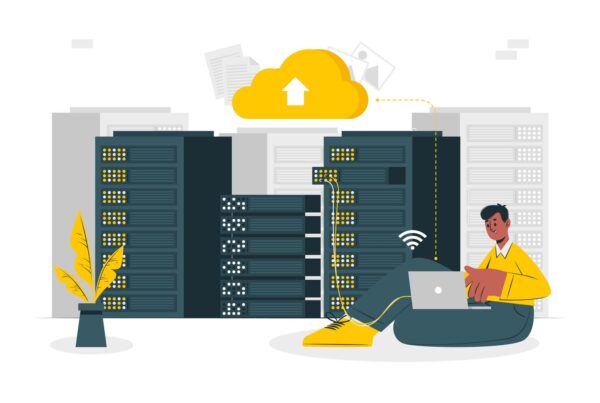The use of cloud technology in the accounting sector is gaining significant traction with time. The perusal of cloud accounting is in works for businesses of all sizes and walks of the industry. Expanding the cloud market rather rapidly.
Many reports have stated that a large chunk of accountants are shifting their businesses to the cloud. Some even quote that it’s as large as 53% of the industry. They’re in unanimity that cloud computing has made their tasks significantly easier.
But with the surge in the adoption of the cloud, the challenges concerning security are rising simultaneously. Yes, performance has increased, but it is difficult for smaller firms to find the best QuickBooks cloud hosting plan to suit their business strategy. There is a galore when it comes to options but with those options, the aspect of security and performance has to be given equal attention.
Let us now know why security and performance are important factors when it comes to QuickBooks cloud hosting:
Apprehending Cloud Security for QuickBooks Hosting
Security in the cloud is inevitable to ensure that QuickBooks software is safe. While your data is more secure in the cloud as compared to the traditional method of storing data, it is only intelligent to understand the security aspect in the right context.
There are procedures, certain policies, system control, and technology, which when put together, help protect the data and infrastructure. Procedural implementation of these measures helps in safeguarding the clients’ privacy and keeping intact the security and authenticity of the data.
Security in the cloud, while hosting QuickBooks, can be configured in accordance with business requirements and size, nature of the business. Factors like traffic and multi-user authentication can also be put into arrangement.
As cloud hosting is managed unilaterally, it eliminates the need for a dedicated administrative team, thus cutting down operational costs significantly. Therefore, we see that it is quintessential to choose a QuickBooks cloud service provider offering best-in-class security, which is customizable as per your individual business requirements.
Zero Down On A Cloud Provider That Ensures Apt Security
When selecting a cloud provider to host your QuickBooks software, look for one that gives you an option and control as to where your data is stored and managed. You should be well informed by your cloud provider about the location and capacity of their data centers.
Do not skip on evaluating whether or not they provide proper data encryption. Critical data should be encrypted so as to avoid data accessibility to unauthorized users. Be well-read of your hosting provider’s security policy to decide if they are in alignment with your firm’s business approach.
Debunking Cloud Security Myths
As more and more accounting firms are moving their operations to the cloud,
there are a few inevitable concerns and myths which come up around its security.
These are some of the common myths related to cloud security:
MYTH- Public cloud isn’t secure
FACT- When cloud technology was first introduced, people were concerned about the level of data security that would be associated with it. Now, as a pleasant outcome, this is not a concern anymore, given the performance that the cloud has demonstrated.
With decades worth of market presence, QuickBooks cloud hosting providers have invested significantly in security measures and for the use of updated technology to make sure that your data is rendered the best notch of security that there is. QuickBooks providers can now backup data in different geographical areas, which makes them way more reliable and secure as compared to on-premise data storage.
MYTH-Anyone can access the data in the cloud
FACT- Losing control or data leak or mishandling of data are some of the major concerns people have while migrating their QuickBooks software to the cloud.
However, data privacy is one of the prime benefits offered by cloud technology. It is way more difficult for hackers to debunk data that is stored in the cloud as compared to on-premise or physically stored data. Popular research showed that 95% of failures in cloud security would be because of the end-user and not because of the data being stored in the cloud or remotely.
MYTH- It is easier for hackers to attack data in the cloud
FACT- It’s a common assumption that as cloud providers maintain and manage a number of data sources and data modules at once, each individual’s data is prone to breach and is more vulnerable. On the contrary, truth holds as most reputed cloud hosting providers adopt best in class security measures, such as fully-clustered multi-tier cloud infrastructure backed by 256-bit encryption and 24-hr network monitoring. All these security protocols make your data more secure and under better surveillance.
Decoding Cloud Performance for QuickBooks Hosting
The performance of an accounting firm or the user experience of a particular software largely depends on the performance of the cloud. Choose a provider that can deliver steady yet sporadic performance at scale.
Some of the key parameters in cloud performance that firms should look out for, prior to hosting QuickBooks on the cloud:
a) Scalability and Elasticity: Elasticity and Scalability offered by QuickBooks on the cloud helps reduce the overall business costs and provides ameliorated performance.
These factors can be evaluated through bandwidth, servers, and data warehouses. The cloud provider’s short and long-term strategy and service level should also be kept into perspective consideration.
b) Flexibility: This becomes a significant factor when evaluating the performance of a cloud provider. It’s desirable that the migration of applications to the cloud be cost-effective and convenient. There should be flexibility in terms of operating systems, databases, and programming models.
c) Downtime Issues: The foremost agenda when migrating a business to the cloud is to have undenied round the clock access to work, so as to increase productivity by multiple folds. For this, it is more than necessary that there be minimum downtime. Evaluate the cloud provider’s performance against their SLAs for the past year. Perfection can’t be expected as downtime is inevitable and all cloud providers face it, but it should be as less as possible.
d) Disaster Recovery: All this while we have been talking about data security. Data security becomes the prime issue when a premise or a data center is hit by a disaster or a mishap. This is where a cloud provider’s data recovery module comes into play. While evaluating the QuickBooks cloud provider, learn about their backup systems, contingency, and recovery in case of failure. Ask them how much time it takes for data retrieval and whether or not they have multiple recovery stations at varied locations.
A Word To Infer
Moving to the cloud is smart, but it is smarter to be smart when choosing your cloud provider. Peruse and Pick! Thorough research and planning makes sure that the QuickBooks cloud provider you choose, provides the performance and security that fits your bill and your needs of safeguarding your data, and that they’re secure enough for you to trust them.








